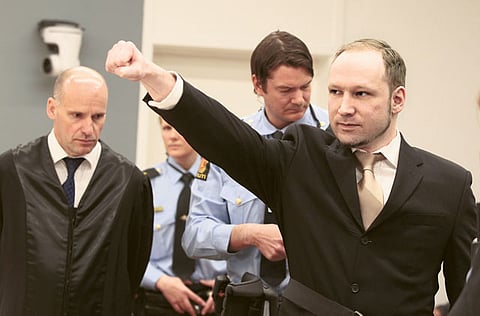Norway killer admits to massacre, claims self-defence as trial opens
Key issue to be resolved in court is state of Breivik's mental health

Oslo, Norway With a defiant closed-fist salute, a right-wing fanatic yesterday admitted to a bomb-and-shooting massacre that killed 77 people in Norway but pleaded not guilty to criminal charges, saying he was acting in self-defence.
On the first day of his long-awaited trial, Anders Behring Breivik rejected the authority of the court as it sought to assign responsibility for the July 22 attacks that shocked Norway and jolted the image of terrorism in Europe.
Dressed in a dark suit and sporting a thin beard, Breivik smiled as a guard removed his handcuffs in the crowded court room. The 33-year-old then flashed his salute before shaking hands with prosecutors and court officials.
"I don't recognise Norwegian courts because you get your mandate from the Norwegian political parties who support multiculturalism," Breivik said in his first comments to the court.
Eight people were killed in Breivik's bombing of Oslo's government district and 69 others were slain in his shooting massacre at the left-leaning Labour Party's youth camp on Utoya island outside the capital. Breivik has said the attacks were necessary to protect Norway from being taken over by Muslims.
"I admit to the acts, but not criminal guilt," he told the court, insisting he had acted in self-defence.
Radical witnesses
The key issue to be resolved during the 10-week trial is the state of Breivik's mental health, which will decide whether he is sent to prison or into psychiatric care. Anxious to prove he is not insane, Brevik will call right-wing extremists and radical Islamists to testify during the trial, to show that there are others who share his view of clashing civilisations.
During yesterday's opening session, he remained stone-faced and motionless as prosecutors read the indictment on the terror and murder charges, with descriptions of how each victim died, and when they explained how he prepared for the attacks.
But he suddenly became emotional when prosecutors showed an anti-Muslim video that he had posted on YouTube before the killing spree, wiping away tears on his cheek with trembling hands.
After a lunch break, Breivik was again expressionless as he watched prosecutors present surveillance footage of the Oslo explosion. The blast ripped through the high-rise building that housed government headquarters, blowing out windows and filling surrounding streets with smoke and debris.
Breivik also said he doesn't recognise the authority of Judge Wenche Elisabeth Arntzen, because he said she is friends with the sister of former Norwegian Prime Minister and Labour Party leader Gro Harlem Brundtland.
The anti-Muslim militant described himself as a writer, currently working from prison, when asked by the judge for his employment status.
He claims he targeted the government headquarters in Oslo and the youth camp to strike against the left-leaning political forces he blames for allowing immigration in Norway.
While Norway has a legal principle of preventive self-defence, that doesn't apply to Breivik's case, said Jarl Borgvin Doerre, a legal expert who has written a book on the concept.
"It is obvious that it has nothing to do with preventive self-defence," Doerre told The Associated Press.
If deemed mentally competent, Breivik would face a maximum prison sentence of 21 years or an alternate custody arrangement under which the sentence is prolonged for as long as an inmate is deemed a danger to society.
Sign up for the Daily Briefing
Get the latest news and updates straight to your inbox



